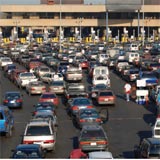
The Domino Effect
Keeping secure in a climate-changed future
- By Megan Weadock
- Oct 20, 2008
In some ways, the 21st century has, so far, been a hostile time, with the Sept. 11, 2001, terrorist attacks, multiple school shootings, bombings in London and Spain, reports of increased border traffic and violence, and more. At the same time, countless studies on climate change have warned us all that -- if nothing else -- the future may be one volatile place, with glaciers melting, sea levels rising and severe weather becoming more of a norm.
A government report cautions that the remainder of the century may be even more perilous than these first eight years -- thanks to climate change itself.
A Changing World
Climate change could lead to destabilized developing countries around the world, causing mass immigration and fostering terrorism, Thomas Fingar, chair of the National Intelligence Council, told Congress in June. Fingar's assertions were based on a classified report, the "National Intelligence Assessment on the National Security Implications of Global Climate Change to 2030," which drew data from U.S. government, military, academic and United Nations studies of climate change.
Fingar explained that climate change "will aggravate existing problems such as poverty, social tensions, environmental degradation, ineffectual leadership, and weak political institutions," according to CNN. "The conditions, exacerbated by the effects of climate change, could increase the pool of potential recruits into terrorist activity. Economic refugees will perceive additional reasons to flee their homes because of harsher climates."
This influx of immigrants may put additional pressure on countries, such as the United States, that are already struggling with border security.
In addition to these population issues, climate change also may impact our ability to secure the nation's critical infrastructure, especially those transportation, utility, and communication systems that lie near the coasts and in the drought-stricken West.
"Most studies suggest the United States as a whole will enjoy modest economic benefits over the next few decades, largely due to the increased crop yields," Fingar explained to Congress. "Costs begin to mount thereafter, however, and some parts of the United States--particularly built-up coastal areas--will be at greater risk of extreme weather events and potentially high costs related to losses in complex infrastructure."
It's a chilling thought --the United States overrun with a tide of immigrants from around the world, clamoring for economic sanctuary, while ever-worsening storms and weather conditions disrupt daily life more often. Add to that the possibility of increased terrorist threats, and it becomes clear how important security will continue to be in the near future.
The Security Industry's Take
So is the report legitimate or just another global warming scare? Two experienced industry professionals seem to think it is at least worth noting.
Jenifer Fritz, vice president of business security solutions for a federal government contractor, said climate change may in fact have an effect on global security.
"The fact is, people need to put food on their tables," she said. "If they are forced to leave their countries as a result of flood, drought, or other natural disaster, they will follow the food and the jobs. If there is not enough work to support the influx of population, the terrorists in these areas will be more than happy to recruit and pay these desperate, vulnerable people, providing them the means to survive."
Steve Birkmeier, vice president of Arteco Vision Systems, a provider of intelligent video solutions, believes one future difficulty will lie in the growing number of security cameras installed in both public and private settings.
"The major challenge for the security industry will be continuing to provide new and innovative tools to effectively manage the flood of data coming in from the extreme growth of digital video," he said. "In many ways, too much information is about as useful as no information at all -- because it becomes impossible to understand. It will create massive bandwidth and storage issues, not to mention slowing the efficiency of security to react to situations."
Video analytics, Birkmeier said, will continue to be the most effective way to filter and manage all of that video data.
"It will eventually play a role in virtually every active video channel in all environments," he said.
If global stability continues to be disrupted, doing more with less may become the order of the day in the security industry.
"As the need for increased physical security becomes greater and greater, the industry will continue to be tasked with providing products that allow organizations to achieve more with fewer resources," Birkmeier said. "This will require interoperability between physical security systems, as well as innovation in current technologies to make the process more efficient. There needs to be more cooperation between manufacturers to execute the framework to integrate various physical security platforms.
"Video analytics also will play a key role in helping organization be more effective with fewer resources. The real-time alerts and new innovations drastically conserve network resources and allow security operators to multitask without reducing the effectiveness of the security environment."
Fritz, meanwhile, sees the merit of acting now. "While I believe there is a tremendous opportunity for security products and solutions now and in the near future, I think in some cases, by the time we are applying a security solution to this problem, we've missed it," she said. "Climate change has been seen to have a negative economic impact. Rather than wait for people to become desperate and thus become a threat to society, we need to be proactive in preventing the instability by providing education, training, and jobs -- thus limiting the security threats to society. By providing the populations affected with a way forward, we can prevent their turning to crime or terrorism as a last resort."
About the Author
Megan Weadock is the managing editor of Security Products magazine. This article first appeared in the September 2008 issue.